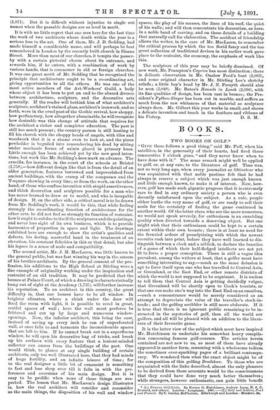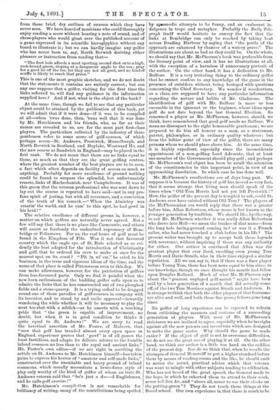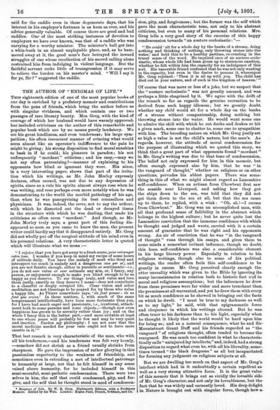BOOKS.
TWO BOOKS ON GOLF.*
" GrvE these fellows a good thing," said Mr. Puff, when his- satellites, in the generosity of their hearts, had fired three consecutive 1 o'clock guns, "and they never know when to- have done with it." The same remark might well be applied to golf, or, at any rate, to the literature of golf. Time was, not so very long ago, when every journalist or littirateur who• was acquainted with that noble pastime felt that he had always in reserve a subject which was just enough known and little enough known, to make it of interest. Now, how- ever, golf has made such gigantic progress that it is extremely rare to find in any ordinary society a person who is even decently uninformed upon the subject. As a rule, people- either loathe the very name of golf, or are ready to sell their souls for the certainty of finding the game continued in another world. Of the latter class, who are the more numerous, we would not speak severely, for enthusiasm is an ennobling- quality when directed towards a deserving object. But one might wish that their enthusiasm could be kept to a certain extent within their own breasts ; there is at least no need for the frenzied ardour of proselytising with which the newest recruits rush into print, before they have well learned to dis- tinguish between a cleek and a niblick, to declare the beauties- of a game of which their half-fledged intellects are not yet, fit to form a proper conception. There is still a vague idea. prevalent, among the writers at least, that a golfer must have something interesting to say,—much as the same delusion is apt to force itself upon one who has travelled to Central Asia, or Greenland, or the East End, or other remote districts of which the world is not supposed to be cognisant. It is useless to tell them that Central Asia is getting decidedly vulgar,. that Greenland will be shortly open to Cook's tourists, or that one can make one's way into the East End on an omnibus, —such a remonstrance would be merely considered as an attempt to depreciate the value of the traveller's stock-in- trade ; and the golfing scribbler is still more obdurate. If it- is true that there is no ignorant public remaining to be in- structed in the mysteries of golf, then all the world are golfers, and all will be pleased with an addition to the litera- ture of their favourite game.
It is the latter view of the subject which must have inspired. Mr. Hutchinson to undertake his somewhat heavy compila- tion concerning famous golf-courses. The articles herein contained are not new to us, as most of them have already appeared in another form, seasoning with a wholesome tedium the sometimes over-sparkling pages of a brilliant contempo- rary. We wondered then what the exact object might be of the composition of this golfing Bradshaw. To those who are acquainted with the links described, almost the only pleasure to be derived from these accounts would be the consciousness that they could have done very much better themselves ; while strangers, however enthusiastic, can gain little benefit * (1.) Famous Golf-Links. By Horace G. Hutchinson, Andrew Lang, H. S. Q. Everard, and others. London : Longman. 1891.—(2.) Golf and Golfers, Pas t and Present. ByT. Gordon McPherson. Edinburgh and London : Blackwo,ds. from these brief, dry outlines of courses which they have never seen. We have heard of musicians who could thoroughly enjoy reading a score without hearing a note of sound, and of chess-players who would gloat over the published account of a game expressed in its scientific hieroglyphics without any board to illustrate it ; but we can hardly imagine any golfer who has never been to, say, North Berwick deriving either pleasure or instruction from reading that—
"The first hole affords a most sporting second shot on to a high, rock-bound green, sloping at a dangerous angle to the sea; pray for a good lie off the tee, for they are not all good, and no kind of scuffie is likely to reach that green."
This is one of the most graphic sketches, and we do not doubt that the statements it contains are entirely correct; but can any one suppose that a golfer, visiting for the first time the links referred to, will find any guidance in the information supplied here? And if not, what is the object of the book ?
At the same time, though we fail to see that any particular -object could be attained by the publication of this book, yet we will admit that if it were done—if it was to be compiled at all—when 'twas done, then, 'twas well that it was done by Mr. Hutchinson and his friends, who, as far as their names are revealed to us, are for the most part first-class players. The particulars collected by the industry of these gentlemen refer to some score of golf-courses, of which perhaps seven—St. Andrews, Prestwick, Musselburgh, and North Berwick in Scotland, and Hoylake, Westward Ho, and the new course at Sandwich in England—may be placed in the first rank. We do not mean that there are no links equal to these, so much as that they are the great golfing centres, where the greatest number of the best players are to be seen, a fact which often depends on facility of access as much as anything. Probably for mere excellence of ground nothing • could be found to surpass the splendid, but unfortunately remote, links of Machrehanish, near Campbeltown. It was of this green that the veteran professional who was sent down to lay out the course is reported to have said—not in any pro- fane spirit of jesting, but with all reverence, and a conviction of the truth of his remark,—" When the Almichty was creatin' the warld, and he cam' to this spot, he had gowf in his heid ! "
The relative excellence of different greens is, however, a matter on which golfers are naturally never agreed. Not a few will say that there is no place like Carnoustie, and others will assert as fearlessly the undoubted supremacy of Bem- bridge or Felixstowe. For us, the real home of golf must be found in the Kingdom of Fife. Was it not that favoured -country which the- eagle eye of St. Rule selected as so evi- dently the best adapted for the introduction of Christianity and golf, that he ordered his crew to make at once for the nearest spot on its coast ? "Pit in wi' em," he cried to his boatmen, in the terse and vigorous idiom of the time, and the name of that place is called Pittenwean even to this day. We can make allowances, however, for the patriotism of golfers from less-favoured parts. Only we find it painful when the new-born enthusiasm of the budding golfer calls upon us to admire the links that he has constructed out of two ploughed fields and a stone-quarry. It is a trying ordeal to be dragged round one of these parodies of golf-courses in company with its inventor, and to stand by and smile approval—inwardly wondering the while whether it will be necessary to play the next tee-shot with a niblick—as he asserts with a touching pride that " the green is capable of improvement, no -doubt, but when it is in good condition he thinks it -quite equal to St. Andrews !" We are sorry to read the heretical assertion of Mr. Foster, of Malvern, that
-"now that golf has invaded almost every open space in. England, experience proves that `gowf' is of all games the
least fastidious, and adapts its delicate science to the humble inland common no less than to the royal and ancient links." Mr. Foster's own editor—if we are right in ascribing the article on St. Andrews to Mr. Hutchinson himself—has taken
-pains to express his horror of " amateur and self-made links," constructed over the unsuitable and heavy ground of inland
commons, which usually necessitate a brute-force style of play only worthy of the kind of golfer of whom an irate St. Andrews veteran said that "he's just a d—d Englishman, and he calls golf exercise !"
Mr. Hutchinson's compilation is not remarkable for brilliancy of writing, many of the contributions being spoiled by spasmodic attempts to be funny, and an exuberant in- dulgence in trope and metaphor. Probably the Daily Tele- graph itself would hesitate to convey the fact that the links at Banbridge can only be reached by taking boat across Brading Harbour by saying that "the perils of the approach are enhanced by chances of a watery grave." The illustrations are about as bad as they could be. On the whole, we should say that Mr. McPherson's book was preferable from the literary point of view, and it has no illustrations at all, with the exception of a harmless if unnecessary portrait of the author. On the other hand, it has a dedication to Mr. Balfour. It is a very irritating thing to the ordinary golfer that he cannot confess to any knowledge of the game in the presence of outsiders without being besieged with questions concerning the Chief Secretary. We wonder if woodcutters, as a class, are supposed to have any particular information regarding the nature and habits of Mr. Gladstone. The identification of golf with Mr. Balfour is more or less excusable in the ignorant or the beginner, whose ideas upon golf do not date beyond the last General Election. So renowned a player as Mr. McPherson, however, should, we think, have remembered that good golf needs no Balfour. We mean no disrespect to the right honourable gentleman ; we are prepared to do him all honour as a man, as a statesman, patriot, philosopher, or in ordinary quality whatever; but from the loftier point of view of the golfer, there are many persons whom we should place above him. At the same time, it is highly expedient, especially since the inconsiderate appointment of a non-golfing Lord Advocate, that at least one member of the Government should play golf ; and perhaps Mr. McPherson's real object has been to recall the attention of the constituencies to this important point, in view of an approaching dissolution. In which case he has done well.
Mr. McPherson's recollections are of days long past. We suppose it is because the history of golf has moved so very fast, that it seems strange that living man should speak of the times when " Old Tom Morris had not yet left Prestwick !" How, the golfer of the present day is tempted to ask, could St. Andrews ever have existed without Old Tom The players of the McPhersonian era would reply that there was a greater before him, Allan Robertson, whose name is but known to the younger generation by tradition. We should like, by-the-way, to ask Mr. McPherson whether it was really Allan Robertson who drove into Hell—we mean the bunker of that name—from the long hole teeing-ground coming in ? or was it a French sailor, who had never touched a club before in his life ? The present writer was brought up to accept both these legends with reverence, without inquiring if there was any authority for either. Onr author is convinced that Allan was the greatest player that ever lived, excelling even young Tom Morris and Davie Strath, who in their time enjoyed a similar reputation. All we can say is, that if there was a finer player before Young Tom, there has been none equal to him since, to our knowledge, though we once thought his mantle had fallen upon Douglas Rolland. Much of what Mr. McPherson says about the "greatest unplayed golf-match" might have been said by a later generation of a match that did actually come off, of the two Tom Morrises against Strath and Anderson. It is strange to think that both the elder players of that foursome are alive and well, and both those fine young fellows gone long since.
No golfer of long experience can be expected to refrain from criticising the manners and customs of a succeeding generation of players. With most of Mr. McPherson's strictures we are inclined to agree, especially when he inveighs against all the new patents and inventions which are designed to make the game easier. Why should the game be made easier ? If the object of golf is not to overcome difficulties, we do not see the great use of playing it at all. On the other band, we think our author is a little too bard on the caddies of the present day. Nor do we think that, when he recalls the attempts of General Moncreiff to put a higher standard before them by means of reading-rooms and the like, be should omit to notice the sound, practical advice which that veteran was wont to mingle with other subjects tending to edification. Who has not heard of the great speech the General made to the boys, in which he exhorted them to attend to their work, never tell lies, &c., and "above all, never to use their cleeks on the putting-green"? They do not teach these things at the Board school. Our own experience is, that there is much to be said for the caddie even in these degenerate days, that his interest in his employer's fortunes is as keen as ever, and his advice generally valuable. Of course there are good and bad caddies. One of the most striking instances of devotion to employers we have ever known, was that of a caddie who was carrying for a worthy minister. The minister's ball got into a whin-bush in an almost unplayable place, and, as he ham- mered away at it, the good man's face betrayed the inward struggles of one whose recollection of his sacred calling alone restrained him from indulging in violent language. But the faithful servant reeks little of transgression if it may serve to relieve the burden on his master's mind. " Will I say it for ye, Sir ? " suggested the caddie.












































 Previous page
Previous page